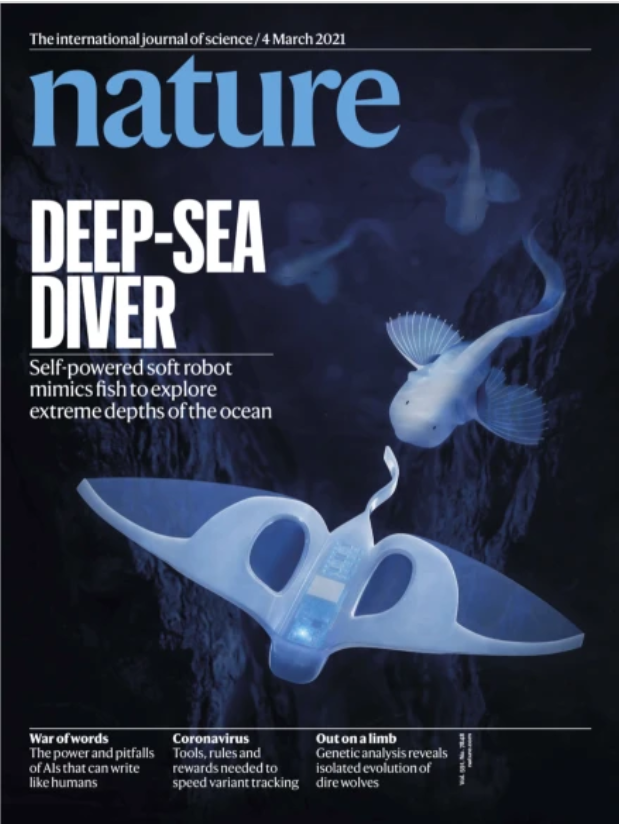March 15, 2021
A Kind of Artificial Muscle to Help Bionic Soft Fish Swim into Mariana Trench
An article on the cover of Nature reports the latest development in soft robot of Zhejiang University: Self-powered soft robot in the Mariana Trench.The bionic soft fish succeed in swimming in the deep sea for the first time as a soft robot.The artificial muscle creates by the Professor Yingwu Luo’ research group from State Key Laboratory of Chemical Engineering, provided key driving materials for the soft fish.

Nature, 2021, 591, 66
The bionic soft fish relies on the dielectric elastomer artificial muscle in the middle ellipse of the two wings to electrically drive and deform, converting the electric energy into mechanical energy to swim.
The low temperature (0-4℃), high pressure (110MPa) and other extreme environment of Mariana Trench bring challenges to the design of dielectric elastomer materials.The electric driving performance of traditional dielectric elastomer materials will be significantly attenuated under high pressure and low temperature.The electric actuating performance of traditional dielectric elastomer materials will be significantly attenuated under high pressure and low temperature.In response to this challenge, the group of Professor Yingwu has Luo designed and prepared SBAS (polystyrene-b-polyacrylate butyl polystyrene-b-polystyrene) elastomeric material with three block copolymers through active emulsion polymerization technology. It has low glass transition temperature, excellent elasticity and excellent electrical drive performance (Macromol. Rapid. Comm., 2017, 38. 1200268) It has become a kind of artificial muscle material that can adapt to the extreme environment of deep sea, such as low temperature and high pressure, helping bionic soft fish swim into the deep sea.
The group of Professor Yingwu Luo has been committed to the controllable design and preparation of new materials by living radical polymerization for a long period.They break through a series of bottleneck problems in the field of active emulsion polymerization, and develops it into a platform technology for preparing new materials of high performance polymers.Using the platform technology, the team control the density of chain entanglement (J. mater. Chem. C, 2017, 5, 6834), selective crosslinking (chem. Eng. J., 2020, 382, 123037), anisotropy (nanoscale, 2020, 12, 7514) and block structure (chem. Eng. J., 2021, 405, 2021, 7514) through the design and preparation of polymer chain structure. It is expected to continue to provide key new materials for soft robots and other fields.
To learn more about Professor Yingwu Luo, go to https://person.zju.edu.cn/en/0096061
To learn more about this paper, go to https://www.nature.com/nature/volumes/591/issues/7848


